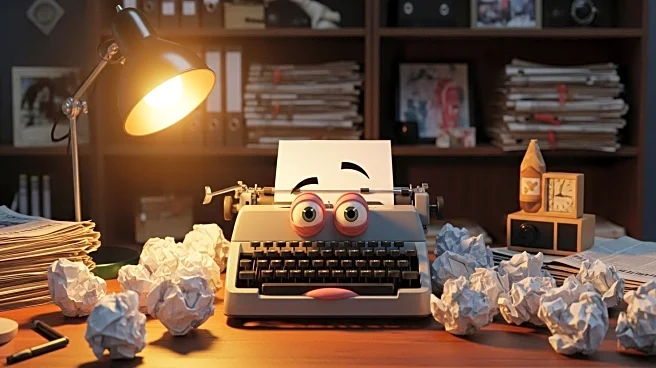What's Happening?
Peacock has launched a new sitcom titled 'The Paper,' set in the same universe as 'The Office.' Created by Greg Daniels and Michael Koman, the show follows the staff of a historic Midwestern newspaper, The Toledo Truth Teller, as they attempt to revive the publication amidst industry challenges. The series stars Domhnall Gleeson as the optimistic editor-in-chief Ned Sampson, who is determined to restore the paper to its former glory. The show highlights the struggles of local newspapers, often referred to as 'ghost newspapers,' which have been reduced to shells of their former selves due to corporate takeovers and budget cuts. The series has already been renewed for another season, indicating a positive reception.
Why It's Important?
The launch of 'The Paper' is significant as it brings attention to the ongoing challenges faced by the journalism industry, particularly local newspapers. These publications are crucial for community engagement and accountability but have been severely impacted by financial constraints and the rise of digital media. By using comedy to address these issues, the show not only entertains but also educates viewers about the importance of local journalism. The series could potentially influence public perception and support for the industry, highlighting the need for investment in original reporting and the dangers of relying solely on wire services.
What's Next?
With the show already renewed for a second season, viewers can expect further exploration of the challenges faced by the newspaper industry. The series may delve deeper into the creative solutions employed by the staff to keep the paper afloat, potentially inspiring real-world discussions on how to support local journalism. As the show gains popularity, it could also lead to increased awareness and advocacy for the preservation of local news outlets.
Beyond the Headlines
Beyond its comedic narrative, 'The Paper' raises ethical questions about the role of journalism in society and the consequences of its decline. The show underscores the importance of maintaining a free press and the potential risks to democracy when local news is diminished. It also highlights the cultural shift towards digital media consumption and the need for traditional media to adapt to survive.









